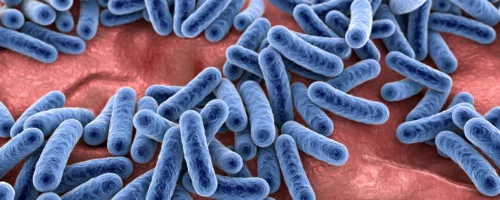Image Courtesy of iStock.
There is a common misconception that all bacteria are bad bacteria. Perhaps this narrative is bolstered by the branding of disinfectants claiming to kill 99.9 percent of all viruses and bacteria or the cartoonishly frightening drawings on the walls of doctor’s offices. This generalization is simply untrue.
Bacteria play a critical role in helping humans maintain a healthy gut. Our gut is an amalgamation of trillions of bacteria that form unique interactions and express various genes essential to their colonization of the gut. This bacterial colonization helps humans to maintain a balanced gut and, consequently, a healthy body. Already, questions abound. How do organisms “decide” which genes to express? Are there genes whose expression is more desirable than others? It is just these questions that Jeongjoon Choi, an associate research scientist in the Department of Genetics at the Yale School of Medicine, focused on answering.
Specific genes are expressed when they receive the direction to do so from regulatory and signaling proteins. “But what I was kind of surprised by is even when you give such an inducing signal, some genes are not expressed under certain conditions,” Choi said. Interestingly, many unexpressed or silenced genes were of a specific variety: horizontally transferred genes (HTGs), also called foreign genes. HTGs are important as they drive bacterial evolution by introducing foreign DNA, and thus new traits, to the recipient organism.
The silencing of foreign genes is done by the heat-stable nucleoid structuring protein (H-NS). Nucleoid structuring refers to how this protein upholds the basic structure of DNA. Building on this function, H-NS represses foreign genes by specifically binding to the corresponding DNA. In some instances, gene silencers like H-NS are beneficial. The laissez-faire expression of all foreign genes at once would be fatal. Unfortunately, however, H-NS can suppress the expression of important HTGs. For foreign genes to be expressed, they must overcome gene repression by the silencer H-NS.
Choi’s study provides new insight into how organisms can overcome foreign gene repression by silencers such as H-NS. It has been a dogma in the field that H-NS amounts remain constant regardless of the conditions. Choi made the groundbreaking discovery that the abundance of H-NS varies in different conditions, such as acidic and neutral conditions. Additionally, in some conditions, H-NS is degraded. “Because H-NS amounts were believed to stay constant, overcoming foreign gene silencing was largely ascribed to anti-silencing proteins,” Choi said. Thanks to Choi’s research, there is a new understanding that both anti-silencing proteins and H-NS degradation work collaboratively to overcome gene silencing by H-NS and control foreign gene expression.
The study focused on Escherichia coli, an example of a “good” type of bacteria. Choi found that for the E. coli to grow in the guts of mice and express HTGs, H-NS had to be degraded. The silencing effect of H-NS can be overcome in two steps. Firstly, the DNA binding regulatory protein PhoP—a protein impacting the expression of certain parts of DNA —displaces H-NS, making it susceptible to degradation. Then, the protease Lon—an enzyme that breaks down proteins—targets specific regions of H-NS to degrade it. With H-NS degraded, E. coli can grow.
“This is basic molecular biology, and I like basic science, but if the basic science wants to change the word, then we need to transfer it, making it more applicable for treatment or another purpose,” Choi said. The impacts of this finding are far-reaching, potentially changing how we address many ailments, from minor bacterial infections to tuberculosis. The possibilities of Choi’s discovery lie in the manipulation of H-NS. “By manipulating H-NS degradability, we can cause our bacteria, not our good bacteria but those big, bad bacteria, to be more susceptible to environmental changes. This will prevent harmful bacteria from causing much of a problem,” Choi said. This approach could work in tandem with antibiotics commonly prescribed to remove harmful bacteria. In cases of intense antibiotic resistance, H-NS manipulation could be the solution: where antibiotics do not work, causing the bacteria to be more vulnerable to the natural processes of our body can make these harmful bacteria unable to cause disease.
Choi’s research done in the guts of mice can be extrapolated, with some caveats, to human health, making leaps in our understanding of how bacteria can be regulated and how we can work to maintain a healthy gut through the development of “good” bacteria.

